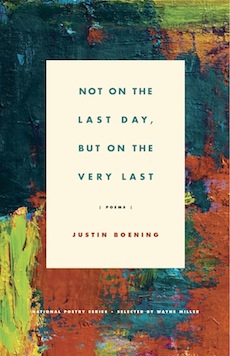| Selected by | Wayne Miller |
|---|---|
| publisher | |
| pages | 80 |
As You Left It
It would have been hilarious
had they allowed me to live
forever, paying in divine wisdom
for all my erotic massages,
tipping the jazz quartet
with whatever cocktail coaster
I’d scribbled on the night before,
but it’s even stranger here,
now, feeling the cool air
as the concierge kicks me
through the kitchen’s
steel back doors, the cruise ship
shoving off from the dock
without me, into the moon-
pocked waves, the stubborn mists,
anything as meaningless
and impossible to imagine as us,
and in the end what drives me nuts
is knowing what I never
thought possible—that when
one returns to his body,
his body will be as he left it,
meaning nakedness on a man
is always a comedy—
and wondering not whether
they’ll have me back
but why, and who will be there
waiting to forgive me
for giving up again.

